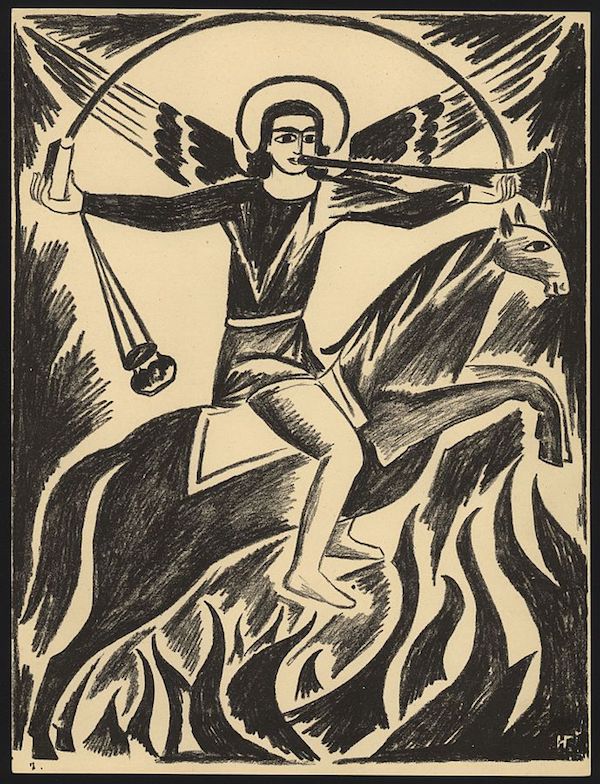AM Psalm 8, 148; Job 38:1-7; Hebrews 1:1-14
PM Psalm 14, 150 or 104; Daniel 12:1-3 or 2 Kings 6:8-17; Mark 13:21-27 or Revelation 5:1-14
On this feast day of St. Michael and All Angels, I am reminded that although we know of them from the Bible, we don’t know all that much about angels. Scripture is is uncharacteristically understated about them, for as relatively important a role that angels play in the Bible. The only thing I’m certain about angels is they probably don’t look a thing like all the sweet little kitschy ones we see in gift shops and internet chain letters.
By the time of Christ, angels were already a part of the ancient Jewish mindset, with some legends already in place about them. A lot of what we understand about angels today also developed in the first six centuries of Christian thought. Michael, in particular, in mentioned in both Hebrew Scripture and the New Testament as, in effect, a prince of angels or captain of angels. We get the sense he would not be recognized by those sweet sparkly gift store angels.
Angels really seem to get around though. They act as messengers in the Bible quite a bit, whether it’s Balaam’s donkey seeing one with a sword, standing in the roadside, silently sending a message to turn back, or the angel Gabriel visiting Mary and telling her she’s about to have the surprise of her life.
Angels seem fairly social (“Greetings favored one!”, “Behold, I bring you tidings of great joy!”). Yet at the same time, they must be kind of scary, because they always seem to be saying “Fear not!” or “Don’t be afraid!” to folks.
We also know that angels attended to Jesus, in his time in the wilderness. Perhaps that, along with Psalm 91, is the root of where our notion of “guardian angels” comes from. We know there was some notion of it in rabbinic literature, and that it was expounded upon in the 4th century by St. Jerome, and a little later 5th by Pseudo-Dionysius the Areopagite. If it’s true I have a guardian angel, I imagine mine as looking like a younger version of Sam Elliott, with a three day growth of beard stubble, a dirty robe, and scuffed, dirty biker boots. I think I could be great friends with an angel like that.
Perhaps the bigger question is, “What are we to learn about God’s love from belief in angels? I would say it is this: Angels teach us a certain kind of holy interconnectedness. We don’t see them, yet we believe they are there as messengers and companions of humankind who serve God in a way we can only hope we serve God. Angels remind us that the labor of a whole company of unseen others provides for us whether we see them or not. If it weren’t for the actions of others, we’d have no clothes to wear, unless you made 100% of your wardrobe by hand. Even then, someone made the cloth. Do we ascribe the honor of angels to the unseen people who enter our lives so silently? Perhaps we should.
Angels like Michael remind us that there are marginalized people in the world who need protection, just as we’d like to believe Michael protects humankind with a radically fierce love. Angels like Gabriel remind us that incarnation is just around the corner. These are all things worth holding dearly in our hearts, even if we don’t understand what it’s all about.
When you imagine your own personification of an angel, what does he/she look like? How does that personification inform the actions of your faith?
Maria Evans splits her week between being a pathologist and laboratory director in Kirksville, MO, and gratefully serving in the Episcopal Diocese of Missouri as a Priest Associate at Church of the Good Shepherd and Chaplain of the Community of St. Brigid, both in Town and Country, MO.
Image: By Natalia Goncharova – нэб.рф, Public Domain, Link

